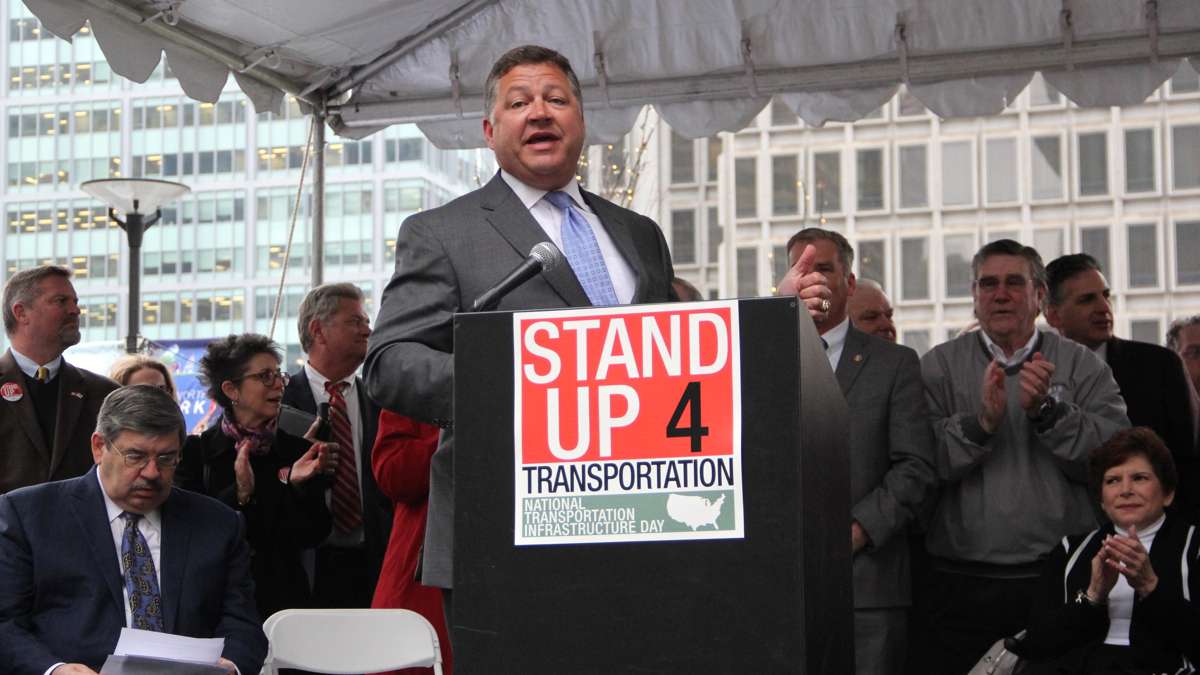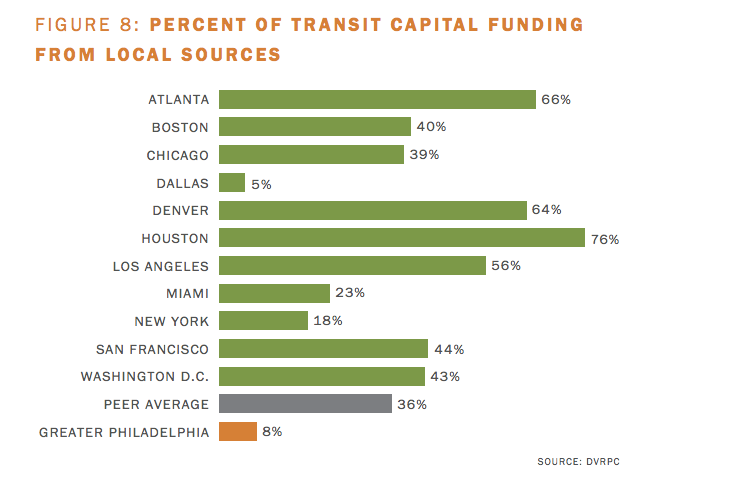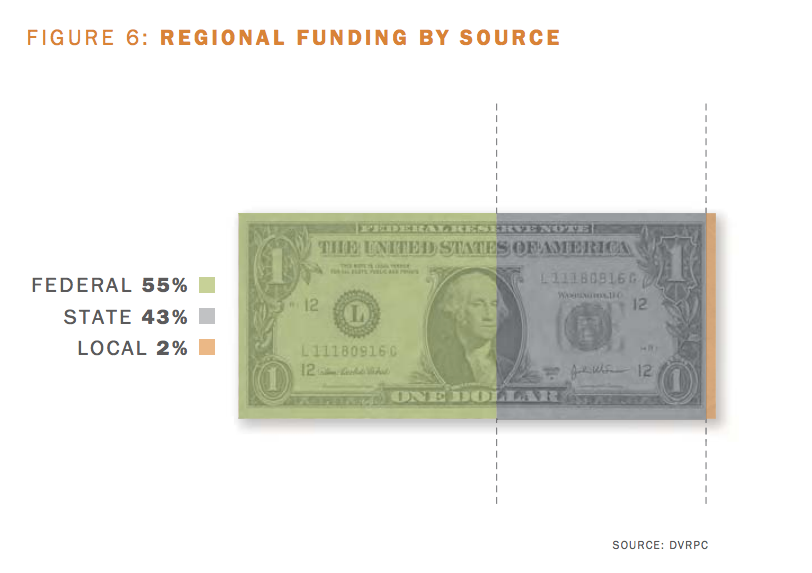Regional Congressmen divided over highway funding, despite apparent accord

It’s not every day that you see Rob Wondering, CEO of the Greater Philadelphia Chamber of Commerce, gladly sharing a stage – and a message – with a handful of union leaders. But on an unusually dreary April morning, such an unusual sight was inspired by a dreary topic: the deteriorated state of transportation infrastructure and the rapidly depleting federal Highway Trust Fund.
Business and labor joined politicians past and present at the “Stand Up 4 Transportation” rally at Dilworth Park, part of a national effort organized by the American Public Transportation Association to pressure Congress into addressing the looming expiration of current federal transportation funding law on May 31st. The rally was organized locally by SEPTA and the Chamber, with dozens of local unions, transit agencies, ridership organizations and transportation advocates joining the cause of urging Congress to replenish the national Highway Trust Fund.
If Congress fails to act, the Highway Trust Fund will go bankrupt in July. As the pressure mounts, one idea for new federal funds – repatriation – has seemed to build support from both parties. But some of that consensus may prove to be illusory.
TAKING A STAND
Former Governor Ed Rendell kicked off the rally with a rousing speech advocating for an increase in the federal gasoline tax. Last raised in 1993, the 18.4 cents per gallon federal gas tax has been the traditional source of nearly all federal transportation funding. But the gas tax isn’t pegged to inflation, and as construction costs increase, each dollar does less.
That problem has been exacerbated in recent years as fuel efficiency standards increase and total vehicle miles traveled decrease: Americans are buying less gas, meaning less money for the trust fund. The gas tax currently raises about $34 billion a year, but the federal government usually spends around $50 billion a year to fund transportation projects.
If federal funds dry up, the result would be devastating for Pennsylvania and New Jersey. Barry Seymour, Executive Director of the Delaware Valley Regional Planning Commission, said that federal funds cover about 50 percent of transportation improvement projects in Southeastern Pennsylvania, and almost two-thirds of projects in South Jersey. “A delay or reduction in federal funds would have a significant impact across the region,” said Seymour.
“Highway Trust Fund” is a bit of a misnomer. Not only does it have nothing to do with helping some attorney’s son pay for sailing lessons, it also covers much more than just highways. The Highway Trust Fund’s insolvency would “affect PennDOT, SEPTA, [and] NJ Transit,” said DVRPC’s Seymour. Seymour also noted that, locally, most of the money is spent on maintaining the region’s infrastructure, rather than expanding it.
While everyone on the stage at Thursday’s rally agreed with the idea of restoring federal transportation funding, consensus disappeared when asked exactly how to do that.
There are currently a handful of different bills in the House and the Senate that can be divided into three general approaches to the issue. The most straightforward approach, and the approach throatily endorsed by Rendell at the rally, would be to simply raise the gas tax to cover the shortfall. But that approach seems the least likely, given Republican anathema to tax hikes of any sort.
However, the idea of repatriation is gaining support from both sides of the aisle and offering hope for a bipartisan solution. But even among repatriation supporters, there appears be a partisan division on how to go about the actual repatriation process. And, somewhat ironically, those two competing visions for repatriation come from the same man, Representative John Delaney (D-MD-6).
WHAT IS REPATRIATION?
Americans are exceptionalists in nearly everything, including corporate tax policy. Whereas most countries only tax income and transactions that occur within their borders, the Internal Revenue Code is extraterritorial, meaning that American corporations must pay federal income taxes on foreign earnings.
Corporations only need to pay those taxes, however, when the money comes home. So, rather than forking over 35 percent to Uncle Sam, many multinational corporations will park part of their foreign earnings offshore. Some of the money is reinvested abroad, like when Apple builds factories in Ireland using its earnings from selling European iPhones. But a large chunk of the estimated $2 trillion sits on the books as cash or other relatively liquid assets, just waiting for a lucky (tax) break before booking it home.
And now Congress is debating another break: a repatriation tax holiday. The idea is simple: for a couple of months, US multinationals can repatriate their foreign profits and pay a substantially lower-than-usual tax. The last US tax holiday in 2004 charged just 5.25 percent, resulting in $362 billion repatriated earnings.
Repatriation seems like free money, but its not. As noted by the non-partisan Congressional Research Service, foreign earnings come back to the States all the time, so these tax holidays actually end up costing the treasury tens of billions of dollars, just like any other tax cut. And by periodically passing repatriation tax holidays, Congress encourages corporations to hold more of their foreign earnings abroad in the hopes that they’ll pass another one soon.
And its like other tax breaks that have been used primarily to stimulate the economy but have had mixed results at best. Rather than reinvest the newly returned foreign profits in new hires or increased development, firms have used repatriated earnings to issue dividends, buyback shares and fund mergers.
The repatriations being proposed today would cost around $96 billion in lost taxes according to the progressive Center for Budget and Policy Priorities. But unlike previous repatriations, these are not tax breaks just for the sake of tax breaks.
Senators Barbara Boxer (D-CA) and Rand Paul (R-KY) have proposed a bill, as has the Obama Administration. Like Rep. Delaney’s Infrastructure 2.0 Act, these all propose a tax break on repatriating foreign earnings, dedicating the tax revenues to the Highway Trust Fund, and vary on specific rates and other details.
Delaney’s believes his bill would provide $120 billion for a six-year transportation funding plan, plus an additional $50 billion for an infrastructure fund that could be leveraged for $750 billion through loans, guarantees and equity from state and local governments. The Infrastructure 2.0 Act would force corporate hands by also imposing taxes on foreign earnings that weren’t repatriated.
But Delaney has also introduced another repatriation bill, the Partnership to Build America Act of 2015. That bill would also create a $50 billion infrastructure fund, but it would do so by selling low-coupon bonds that would allow corporations to repatriate a certain amount of their foreign profits for every $1 they invested. The multiplier would be set by a reverse Dutch auction, making this proposal the far away favorite of any Economics doctoral candidate desperately looking for a dissertation idea. Unlike the Infrastructure 2.0 Act, this bill would not restock the Highway Trust Fund.
TALKIN’ BILLS WITH BILL – FIGURING OUT THE ODDS OF A FEDERAL FUNDING FIX
Despite Congress’s reputation for gridlock and blind partisanship, U.S. Rep. Bill Shuster (9th, Pa.) thinks his colleagues will act before funding runs out. “We’re going to do something this year, I’m confident,” he said.
“We’ve got both sides of the aisle, both sides of the Capital and both ends of Pennsylvania Avenue want to see a long term transportation bill,” added Shuster. “When you got that kind of interest in a long-term bill, I think we can get something done.”
Brendan Boyle would agree.
In a interview earlier in the week with PlanPhilly, the freshman Democrat representing Pennsylvania’s 13th District said he expects Congress to pass a bill. But: “I have a feeling we’ll be [waiting until] May 31st.”
Boyle noted that he co-sponsored a bill to increase the gas tax to 26.3 cents per gallon and then peg it to inflation. Boyle said he hoped Congress would emulate the Pennsylvania Legislature in 2013, which passed Act 89. Then-State Representative Boyle voted for that bill, which doubled state transportation funding by raising Pennsylvania’s own fuel tax. At Thursday’s rally, Rendell noted that none of the state legislators who voted for Act 89 lost their reelection bids, suggesting that the federal legislators had nothing to fear, electorally.
Boyle argued that the only thing blocking passage of a gas tax increase was Republican leadership. “We would see pro-business Republicans, pro-business Democrats, and pro-labor Democrats coming together and we’d have the votes,” said Boyle. “Unfortunately, Speaker Boehner has been reticent to bring up any legislation that would offend the most extreme legislators in his caucus.”
Despite his preference for a gas tax, Boyle said he supported alternative proposals, including Delaney’s Infrastructure 2.0 Act, stressing the need to be “creative as possible” in finding transportation infrastructure funding solutions.
But after the rally, Shuster said any talk about raising the gas tax was just hot air. “Not possible … none of the leadership in Washington is for it.” No Republicans have co-sponsored Boyle’s gas tax bill.
Shuster described a “five or six year [funding] bill” as “critical,” adding “after we get done with this bill, then we really got to start on the next bill.”
When asked if he prefers any specific bills, Shuster said he’s “for wherever we get the money to do a long-term bill.” Shuster specified repatriation as a probable source.
But not every area Congressman is as open minded or creative as Shuster and Boyle.
Rep. Mike Fitzpatrick (R-PA-8) introduced the Partnership to Build America Act alongside Delaney. But Fitzpatrick has not endorsed Delaney’s other bill, which would restore federal highway funding. And the same goes for Rep. Tom MacArthur (R-NJ-3).
MacArthur spoke with PlanPhilly, and stressed his opposition to the “forced” repatriation featured Delaney’s Infrastructure 2.0 Act or the Obama Administration’s proposal.
“Those earnings are already taxed in those countries and I just don’t support that idea,” said MacArthur, noting that those principals would guide his view about any other proposals. MacArthur also said he would prefer to make the bond program in the Partnership to Build America Act permanent, and emphasized his preference for allowing market mechanisms, not tax pressures, decide the amount of repatriated foreign earnings.
For his part, Delaney is focused on passing a version of his Infrastructure 2.0 Act. When asked where Rep. Delaney was focusing his efforts, his spokesman Will McDonald responded with an email, writing: “The Infrastructure 2.0 Act effectively includes the Partnership to Build America Act – it creates the same infrastructure fund and also provides the Highway Trust Fund with six years of solvency. With the Highway Trust Fund set to run out of money on May 31, we’re focused right now on building support for the Infrastructure 2.0 Act.”
Further complicating all of this is the argument by some libertarians and conservatives that the federal government should get out of transportation all together. They argue that states, not the federal government, should be the primary source of transportation funding, saying it would result in a more efficient allocation of resources. Supporters of this vision have a powerful factor in their favor: if Congress does nothing, federal funding will end, forcing the states to scrape together new funds or simply do with less.
In his remarks to the crowd, Rep. Shuster seemed to address this argument a bit, by invoking the Constitution “Article I, Section 8 [says that] the core responsibility of the government [is to], promote interstate commerce, and establish post roads. It’s clear to me that this is a federal responsibility.”
PlanPhilly asked all the area Congressmen to comment. Rep. Donald Norcross is a co-sponsor of the Infrastructure 2.0 Act. Rep. Ryan Costello (R-PA-6), Rep. Chris Smith (R-NJ-4), Rep. Bob Brady (D-PA-1), and Rep. Chakka Fattah (D-PA-2) did not respond, nor did any Senators. Both Brady and Fattah attended the rally, however, and spoke in general support of increased funding. It’s likely that both would support any legislation receiving more than a modicum of Democratic support.
A spokesman for Rep. Patrick Meehan (R-PA-7) wrote “he’s working with colleagues on both sides of the aisle to find creative solutions to fund our transportation needs in a prudent, fiscally responsible way,” but did not respond to a follow-up asking for specifics.
Rep. Frank LoBiondo (R-NJ-1) declined to comment. LoBiondo sits on the house transportation committee.
If the Greater Philadelphia region is any representation, this summer’s slate of bridge repairs, interstate resurfacing and rail improvements might be in trouble.
TRANSPORTATION OFFICIALS AGREE: FIX IT
Representatives from SEPTA, PATCO, PennDOT and MOTU all attended the rally. The actual agencies impacted by Congress’s delays don’t seem to care which solution scheme Congress picks, so long as they pick one, even if it requires a complicated reformulation of the corporate tax code. Perhaps the DVRPC’s executive director said it best: “I’m not sure why anyone thinks tax reform is easier than a gas tax,” said Seymour. “But if that’s what gets it done, then we’ll take it.”
WHYY is your source for fact-based, in-depth journalism and information. As a nonprofit organization, we rely on financial support from readers like you. Please give today.





